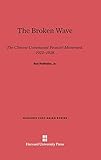The Broken Wave : The Chinese Communist Peasant Movement, 1922-1928 / Roy Hofheinz, Jr.
Material type: TextSeries: Harvard East Asian Series ; 90Publisher: Cambridge, MA : Harvard University Press, [2013]Copyright date: ©1977Edition: Reprint 2014Description: 1 online resource (355 p.)Content type:
TextSeries: Harvard East Asian Series ; 90Publisher: Cambridge, MA : Harvard University Press, [2013]Copyright date: ©1977Edition: Reprint 2014Description: 1 online resource (355 p.)Content type: - 9780674418561
- 9780674418578
- Boerenbewegingen
- Communism -- China
- Communism
- Communisten
- Geschichte Asiens
- Peasant uprisings -- China
- Peasant uprisings
- Political science
- Communism -- China
- HISTORY / General
- HISTORY / Revolutionary
- POLITICAL SCIENCE / Political Ideologies / Communism, Post-Communism & Socialism
- Peasant uprisings -- China
- HISTORY / General
- 951.04/1 18
- DS777.47 .H 65 1977
- online - DeGruyter
| Item type | Current library | Call number | URL | Status | Notes | Barcode | |
|---|---|---|---|---|---|---|---|
 eBook
eBook
|
Biblioteca "Angelicum" Pont. Univ. S.Tommaso d'Aquino Nuvola online | online - DeGruyter (Browse shelf(Opens below)) | Online access | Not for loan (Accesso limitato) | Accesso per gli utenti autorizzati / Access for authorized users | (dgr)9780674418578 |
Frontmatter -- PREFACE -- CONTENTS -- TABLES -- PART ONE: Strategy -- 1 THE BIRTH OF THE RURAL STRATEGY -- 2 MAO TSE-TUNG AS A RURAL STRATEGIST -- PART TWO: Organization -- 3 STAFFING THE REVOLUTION: THE KUOMINTANG PEASANT BUREAUCRACY -- 4 EDUCATION FOR REVOLUTION: THE PEASANT MOVEMENT INSTITUTE -- 5 ORGANIZING THE MASSES: THE PEASANT ASSOCIATIONS -- 6 THE SOCIAL BACKGROUND: EXPLANATIONS OF SUCCESS AND FAILURE -- PART THREE Practice -- 7 ORIGINS OF A REVOLUTION: P'ENG P AI IN HAIFENG, 1922-1924 -- 8 THE POLITICS OF DEPENDENCY: KWANGNING, 1924-1925 -- 9 THE FACE OF THE ENEMY: HUA COUNTY, 1926 -- 10 THE BIRTH OF A PEOPLE'S WAR: HAIFENG, 1927 -- 11 THE DEATH OF A REVOLUTION: HAIFENG, 1928 -- 12 THE LEGACY OF CHINA'S PEASANT MOVEMENT -- APPENDIXES, NOTES, BIBLIOGRAPHY, INDEX -- APPENDIX -- NOTES -- BIBLIOGRAPHY -- INDEX
restricted access online access with authorization star
http://purl.org/coar/access_right/c_16ec
This book is a sophisticated and deeply researched volume on Mao Tse-tung's early leadership and on the formative years of the Chinese Communist Peasant movement. It has been axiomatic in Asian studies that knowledge of the early years of Chinese communism would throw the most light on modern happenings. In this landmark volume, Hofheinz provides the much-needed map for understanding. Hofheinz shows how the rural revolution began, dissects with exquisite care the mentalities of the first leaders, and assesses the early gropings of peasant revolutionaries toward class struggle. He explains why Mao and others came to believe that the huge rural population was the most powerful force in China and that warfare against any visible enemies constituted progress for the Communist cause. Yet the first Chinese Communists failed miserably both as members of the Kuomintang coalition and on their own. The reasons for the great debacle of the 1920s are set out in this book for the first time in all their complexity. As important as this history is, Hofheinz declares, the lessons Mao learned from his defeats are of even greater significance. Mao and his followers shaped every decision in later years to avoid the errors of the past. The author demonstrates how Mao used ruralism, militarization, worship of numbers and not territory, and a fierce autonomy from other political groups to gain his ends.
Mode of access: Internet via World Wide Web.
In English.
Description based on online resource; title from PDF title page (publisher's Web site, viewed 29. Nov 2021)


